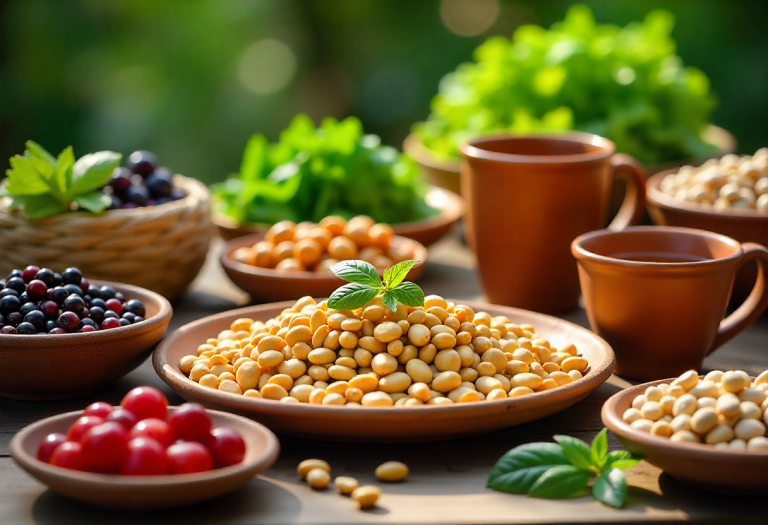Superfoods have taken the health world by storm, but what makes them truly special? These nutrient-dense foods are packed with vitamins, minerals, antioxidants, and other beneficial compounds that support overall wellness, boost immunity, and help prevent chronic diseases. Incorporating superfoods into your daily diet can elevate your nutrition without drastically changing your eating habits. This article explores the best superfoods, their health benefits, and practical ways to include them in your meals.
What Are Superfoods?
Superfoods are natural foods with exceptionally high nutritional value. They are typically rich in antioxidants, vitamins, minerals, fiber, and healthy fats. While there is no scientific definition for “superfood,” these foods are widely recognized for their ability to promote health and prevent illness when incorporated into a balanced diet.
Benefits of Superfoods
Eating superfoods regularly can provide multiple health benefits:
Boosted Immunity: Vitamins and antioxidants strengthen the immune system.
Enhanced Digestion: Fiber-rich superfoods promote gut health and regularity.
Heart Health: Healthy fats and anti-inflammatory compounds support cardiovascular health.
Increased Energy: Nutrient-dense foods provide sustained energy for daily activities.
Mental Clarity: Omega-3s and antioxidants support brain function and reduce stress.
Top Superfoods to Include in Your Diet
1. Berries
Berries such as blueberries, strawberries, raspberries, and blackberries are loaded with antioxidants, vitamin C, and fiber. They help fight free radicals, improve heart health, and support brain function.
Tips to consume:
Add to oatmeal or yogurt
Blend into smoothies
Enjoy as a snack
2. Leafy Greens
Spinach, kale, and Swiss chard are nutritional powerhouses. They provide vitamins A, C, K, calcium, and iron, which support bone health, vision, and immunity.
Incorporate them into meals:
Toss in salads
Blend into green smoothies
Sauté lightly with garlic and olive oil
3. Nuts and Seeds
Almonds, walnuts, chia seeds, and flaxseeds are excellent sources of protein, omega-3 fatty acids, and fiber. They help maintain heart health and support brain function.
How to use:
Snack on a handful daily
Add to breakfast bowls or salads
Mix into baked goods
4. Whole Grains
Quinoa, brown rice, oats, and barley provide fiber, protein, and essential minerals. Whole grains regulate digestion, stabilize blood sugar, and support weight management.
Ways to include:
Replace white rice with quinoa or brown rice
Make overnight oats for breakfast
Use whole-grain pasta in meals
5. Legumes
Beans, lentils, chickpeas, and peas are protein-packed plant foods with fiber and micronutrients. They promote satiety, gut health, and balanced blood sugar levels.
Tips for use:
Make bean soups or stews
Roast chickpeas for a crunchy snack
Add lentils to salads or curries
6. Fatty Fish (Optional for Non-Vegetarians)
Salmon, mackerel, and sardines are rich in omega-3 fatty acids, protein, and vitamin D. They support heart and brain health while reducing inflammation.
Ways to include:
Grill or bake salmon for dinner
Add sardines to salads or sandwiches
Incorporate into meal prep bowls
7. Green Tea
Green tea is a superfood drink rich in antioxidants like catechins. Regular consumption can boost metabolism, enhance brain function, and improve cardiovascular health.
Tips:
Drink 1–2 cups daily
Pair with lemon for added flavor
Avoid adding excessive sugar
Practical Ways to Incorporate Superfoods
Start Small: Add one or two superfoods to your meals each day.
Plan Ahead: Keep frozen berries, nuts, and seeds handy for quick use.
Mix and Match: Combine multiple superfoods in a single meal for maximum benefit.
Experiment with Recipes: Superfood smoothies, salads, and grain bowls are versatile and delicious.
Myths About Superfoods
Superfoods Alone Can Make You Healthy: While they’re nutrient-dense, overall diet quality matters.
You Need Expensive Exotic Foods: Common foods like spinach, oats, and beans are just as powerful.
Superfoods Are Only for Smoothies: They can be incorporated in breakfast, lunch, dinner, and snacks.
Final Thoughts
Superfoods are a simple yet powerful way to elevate your health. By incorporating nutrient-rich berries, leafy greens, nuts, seeds, legumes, whole grains, and optional fatty fish into your daily routine, you can enhance immunity, digestion, heart health, and mental clarity. Remember, consistency is key—regularly consuming a variety of superfoods in balanced meals ensures you gain maximum benefits without drastic lifestyle changes. Start today and make your diet vibrant, flavorful, and nourishing!
